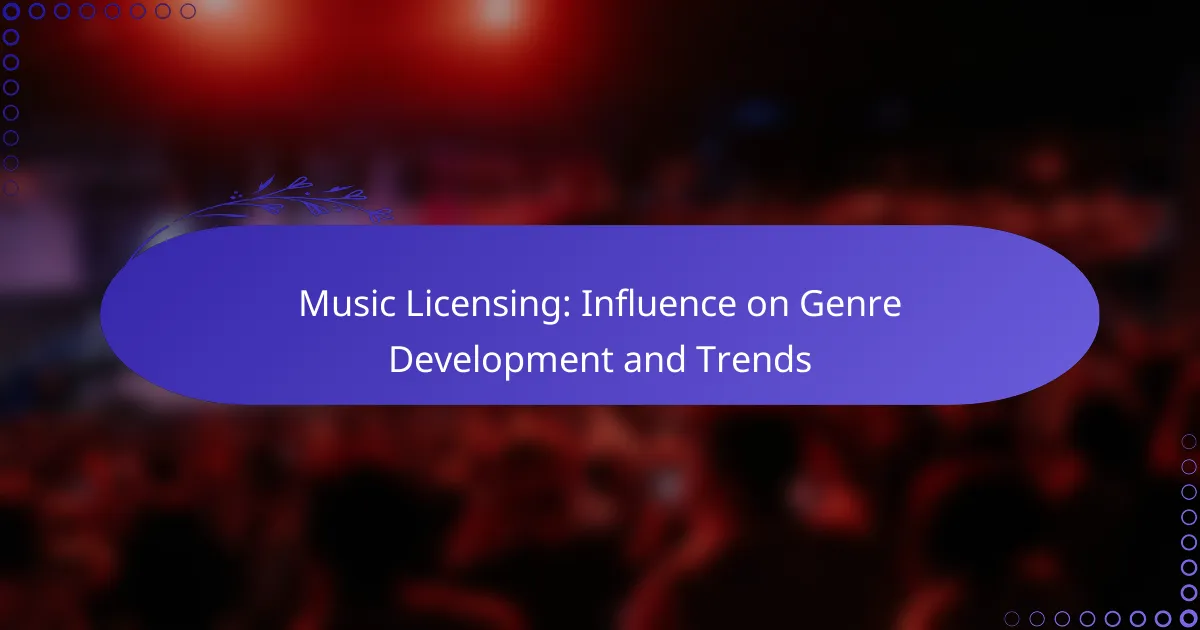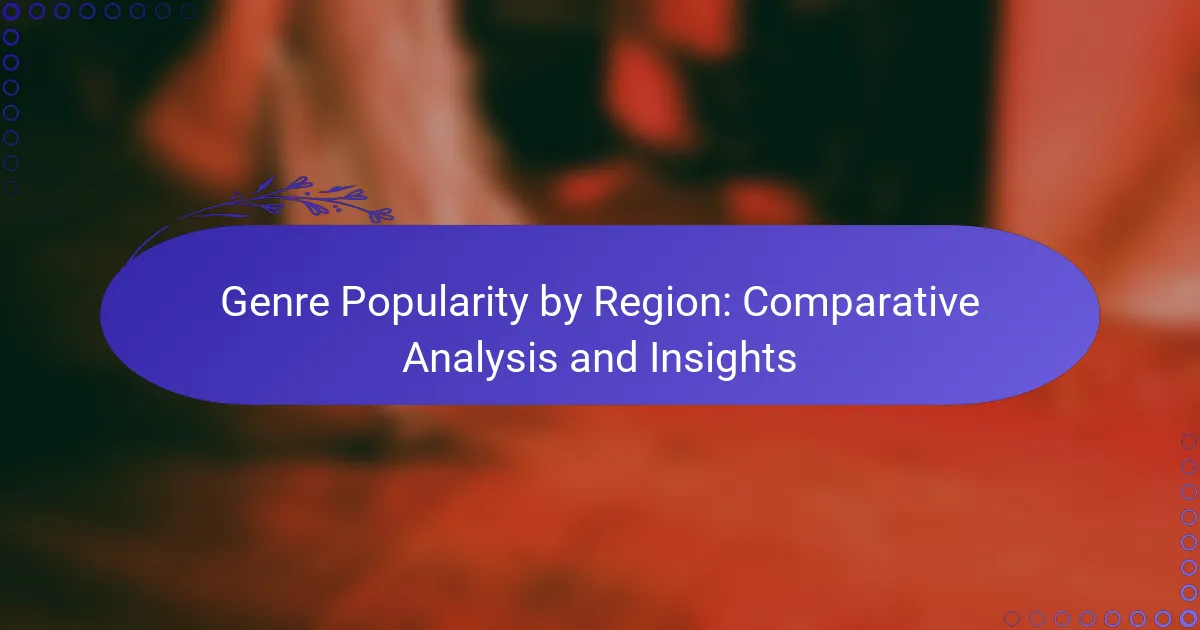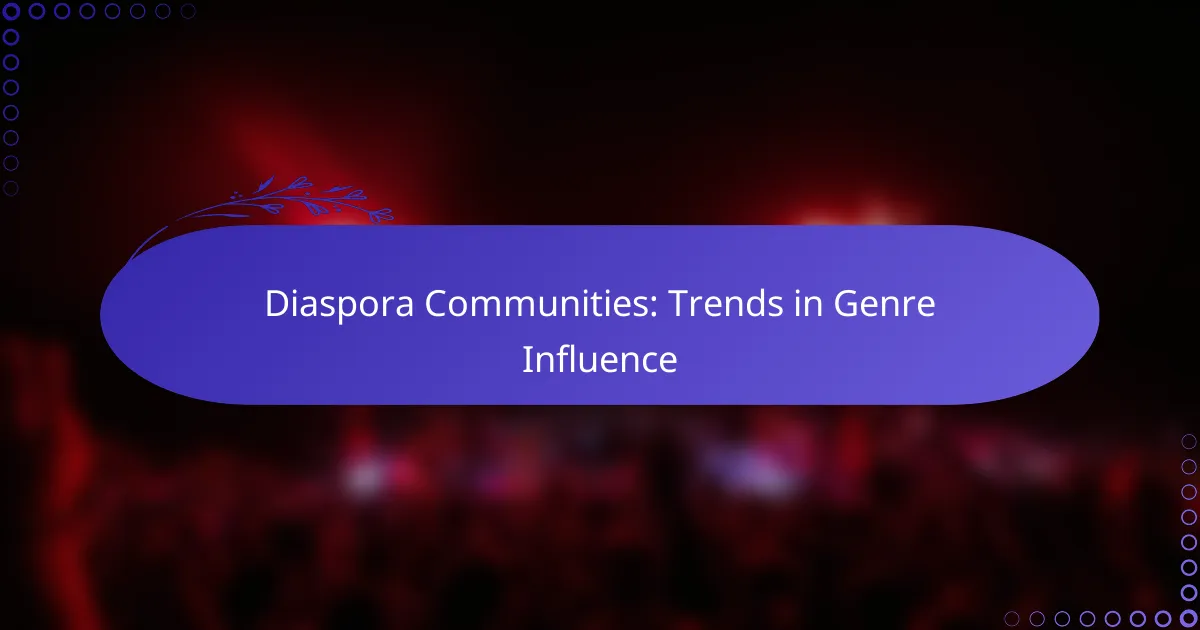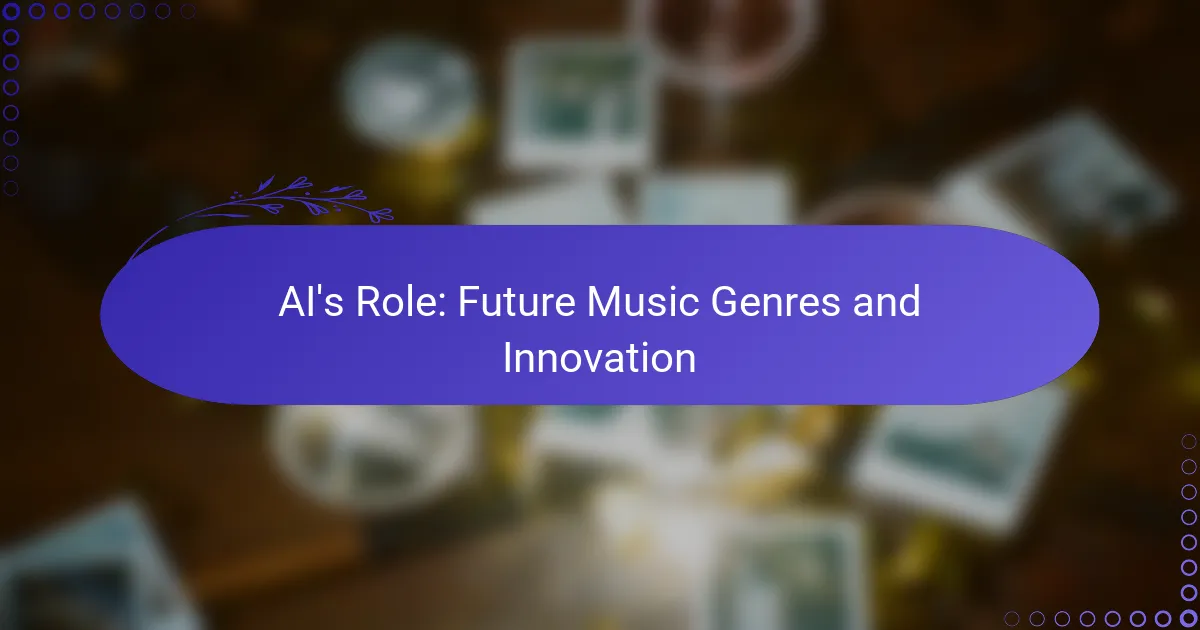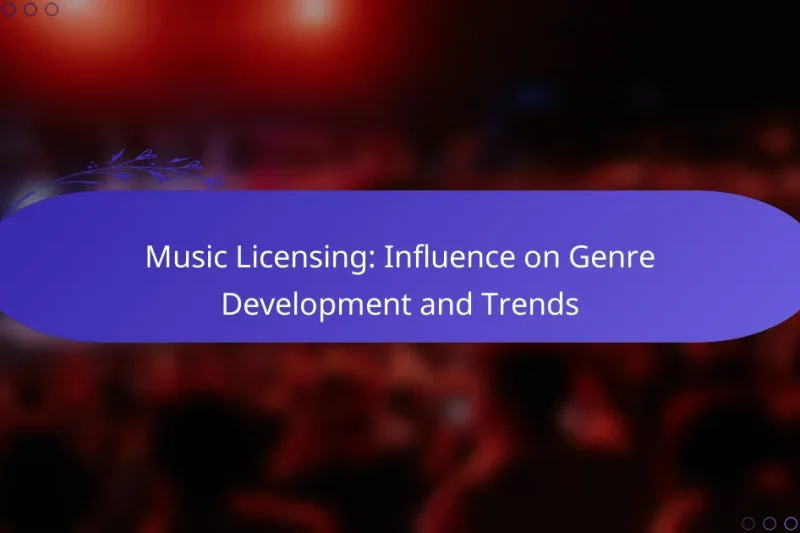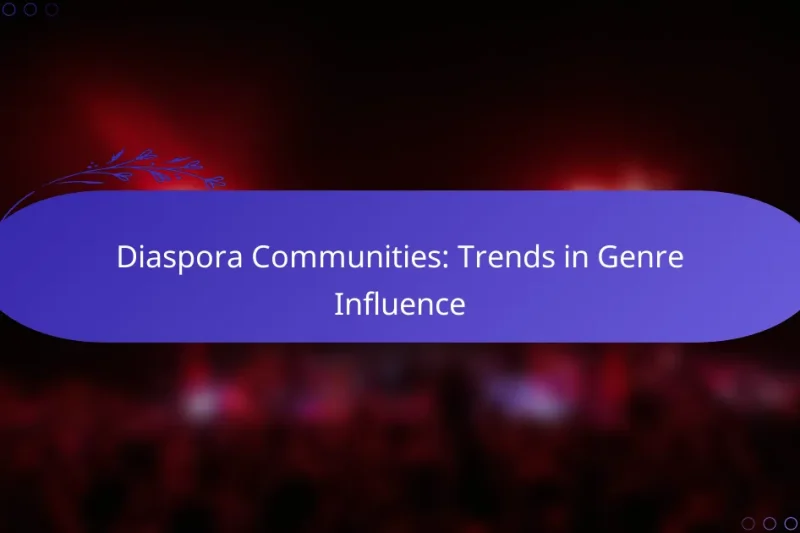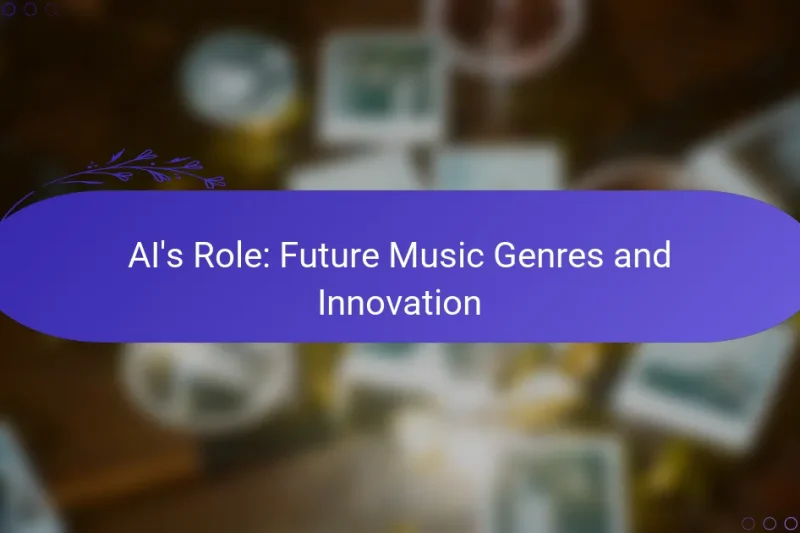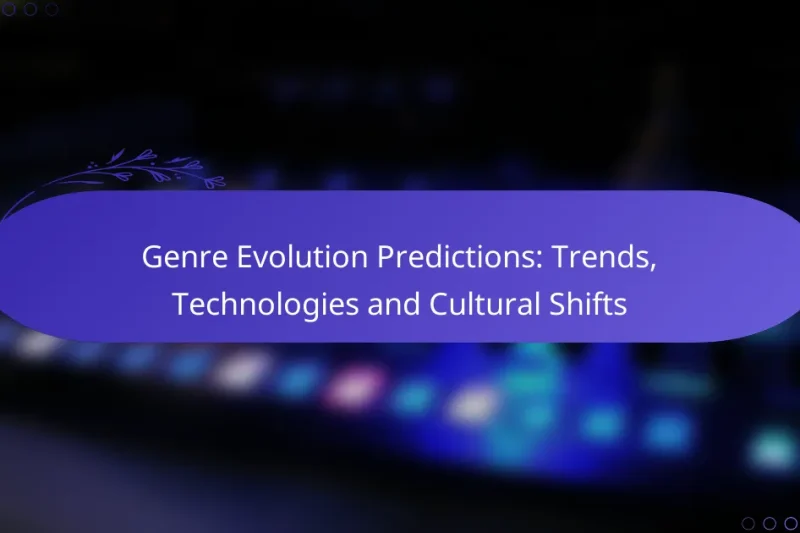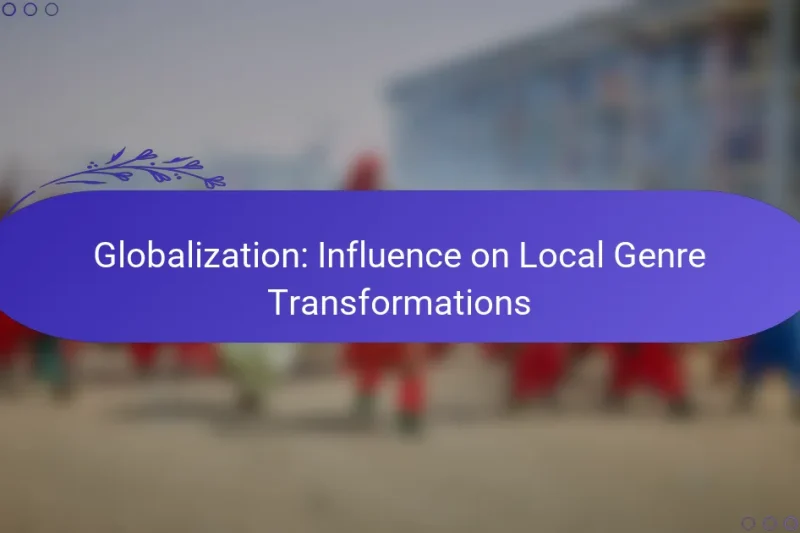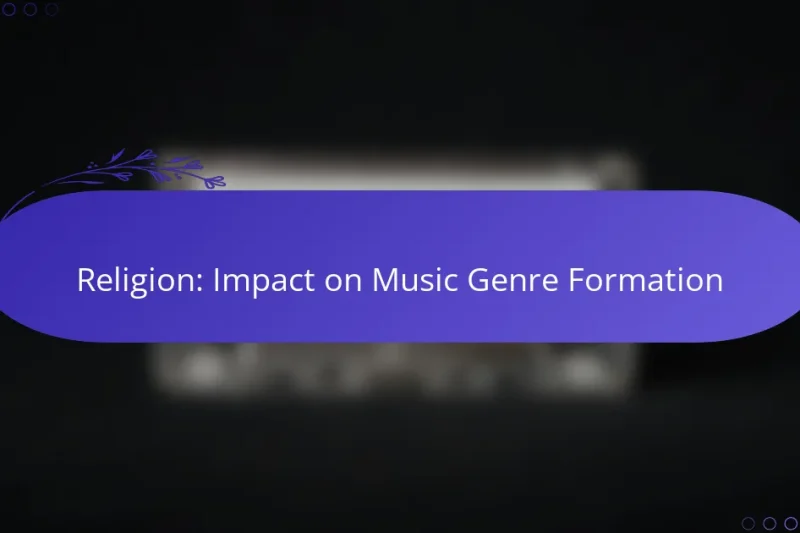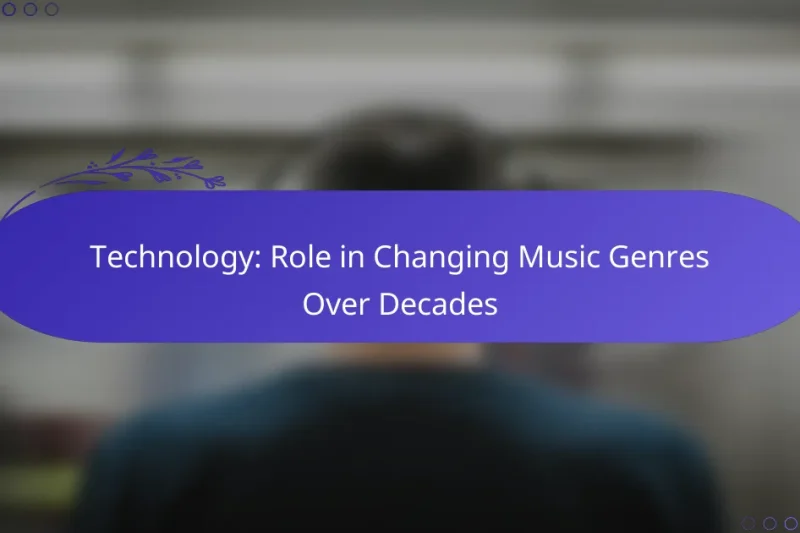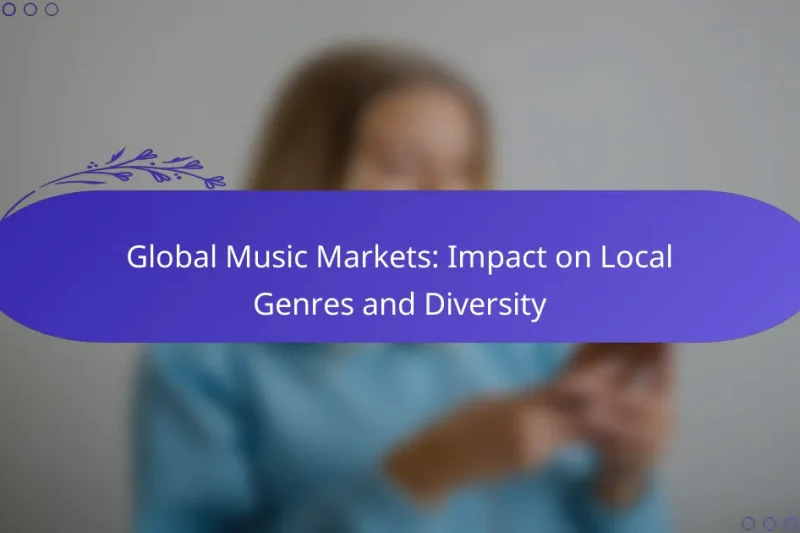Music licensing plays a crucial role in shaping genre development and trends by influencing how and … Music Licensing: Influence on Genre Development and TrendsRead more
Genre evolution refers to the ongoing transformation in storytelling, character development, and audience engagement throughout history. This process is characterized by innovative narrative techniques, the blending of genres, and the impact of technology on how stories are created and experienced. As genres adapt and merge, they not only redefine artistic expression but also reshape audience expectations and interactions with narratives.
Genre Popularity by Region: Comparative Analysis and Insights
The popularity of music genres varies greatly across different regions, shaped by cultural influences, historical contexts, … Genre Popularity by Region: Comparative Analysis and InsightsRead more
Diaspora Communities: Trends in Genre Influence
Diaspora communities play a crucial role in shaping various cultural genres by merging their unique traditions … Diaspora Communities: Trends in Genre InfluenceRead more
Celebrity Collaborations: Effects on Genre Evolution and Trends
Celebrity collaborations play a crucial role in the evolution of music genres by pushing artists to … Celebrity Collaborations: Effects on Genre Evolution and TrendsRead more
AI’s Role: Future Music Genres and Innovation
Artificial intelligence is revolutionizing the music landscape by fostering the emergence of new genres and enhancing … AI’s Role: Future Music Genres and InnovationRead more
Genre Evolution Predictions: Trends, Technologies and Cultural Shifts
The evolution of genres in media is being driven by a confluence of trends, technologies, and … Genre Evolution Predictions: Trends, Technologies and Cultural ShiftsRead more
Globalization: Influence on Local Genre Transformations
Globalization plays a crucial role in transforming local music genres by enabling the cross-cultural exchange of … Globalization: Influence on Local Genre TransformationsRead more
Religion: Impact on Music Genre Formation
Religion plays a crucial role in the formation of music genres by providing thematic content, cultural … Religion: Impact on Music Genre FormationRead more
Technology: Role in Changing Music Genres Over Decades
Technology has played a crucial role in the evolution of music genres over the decades, shaping … Technology: Role in Changing Music Genres Over DecadesRead more
Global Music Markets: Impact on Local Genres and Diversity
The global music market plays a crucial role in shaping local genres, offering artists greater exposure … Global Music Markets: Impact on Local Genres and DiversityRead more
What are the key features of genre evolution?
Genre evolution encompasses the changes and developments in storytelling, character portrayal, and audience interaction over time. Key features include dynamic storytelling techniques, character development trends, the influence of technology, cross-genre blending, and innovative audience engagement methods.
Dynamic storytelling techniques
Dynamic storytelling techniques refer to the evolving methods used to convey narratives. These techniques can include non-linear storytelling, interactive narratives, and immersive experiences that engage the audience in unique ways. For example, video games often employ branching storylines that allow players to influence outcomes.
As genres evolve, creators experiment with formats like transmedia storytelling, where a single story unfolds across multiple platforms, enhancing engagement and depth. This approach can attract diverse audiences and create richer experiences.
Character development trends
Character development trends reflect how characters are portrayed and evolved within narratives. Modern storytelling often emphasizes complex, multi-dimensional characters who undergo significant growth or change. This trend contrasts with earlier archetypes that were more static and predictable.
Additionally, there is a growing focus on diverse representation, allowing for a broader range of experiences and backgrounds. This shift not only enriches narratives but also resonates more deeply with contemporary audiences.
Influence of technology
Technology plays a crucial role in genre evolution by shaping how stories are created and consumed. Advances in digital media, such as streaming services and social media platforms, have transformed traditional storytelling methods, allowing for greater accessibility and interactivity.
Moreover, technologies like virtual reality (VR) and augmented reality (AR) are creating immersive storytelling experiences that challenge conventional genre boundaries. These innovations encourage creators to explore new narrative possibilities and engage audiences in unprecedented ways.
Cross-genre blending
Cross-genre blending involves merging elements from different genres to create innovative narratives. This approach allows for greater creativity and can attract wider audiences by appealing to fans of multiple genres. For instance, a romantic comedy may incorporate elements of science fiction, resulting in a unique viewing experience.
As genres continue to evolve, this blending can lead to the emergence of entirely new genres, reflecting changing cultural tastes and preferences. Creators should consider how blending genres can enhance their storytelling and reach diverse audiences.
Audience engagement methods
Audience engagement methods are strategies used to connect with viewers or readers more effectively. These methods have evolved significantly, with a focus on interactive and participatory experiences. For example, social media platforms allow audiences to engage directly with creators, providing feedback and influencing future content.
Additionally, live events, fan interactions, and user-generated content are becoming increasingly popular. Creators should leverage these engagement methods to build community and foster loyalty among their audience, enhancing the overall experience and connection to the genre.
How has genre evolution impacted storytelling?
Genre evolution has significantly transformed storytelling by introducing new narrative techniques and expanding thematic possibilities. As genres blend and evolve, they reshape audience engagement and expectations, leading to innovative storytelling methods.
Changes in narrative structure
As genres evolve, narrative structures often shift to accommodate new storytelling styles. Traditional linear plots may give way to non-linear timelines, multiple perspectives, or interactive formats, enhancing viewer engagement. For instance, the rise of streaming platforms has popularized episodic storytelling, allowing for deeper character development over time.
Writers should consider how these structural changes can enhance their narratives. Experimenting with flashbacks, parallel storylines, or even audience-driven choices can create a more immersive experience. However, maintaining clarity is crucial to avoid confusing the audience.
Emergence of new sub-genres
Genre evolution has led to the emergence of numerous sub-genres, reflecting diverse cultural influences and audience interests. For example, the blending of horror and comedy has given rise to the "horror-comedy" sub-genre, appealing to viewers seeking both thrills and laughs. Similarly, the fusion of science fiction with romance has created unique narratives that explore human relationships in futuristic settings.
Writers should stay informed about these emerging sub-genres to tap into current trends and audience preferences. Identifying niche markets can also provide opportunities for innovation and creativity in storytelling.
Shifts in audience expectations
As genres evolve, audience expectations shift, influencing how stories are crafted and presented. Modern viewers often seek more complex characters and morally ambiguous situations, moving away from traditional hero-villain dynamics. This shift encourages writers to create multifaceted characters that resonate with contemporary societal issues.
To meet these evolving expectations, writers should focus on character depth and realistic conflicts. Engaging with current social themes can enhance relatability and foster a stronger connection with the audience. However, it’s essential to balance complexity with accessibility to maintain viewer interest.
What are the historical milestones in genre evolution?
Historical milestones in genre evolution mark significant shifts in literary styles, themes, and audience expectations. These changes often reflect broader cultural movements and technological advancements that shape how stories are told and consumed.
Key literary movements
Literary movements have played a crucial role in genre evolution, influencing the development of various styles and themes. For example, the Romantic movement emphasized emotion and individualism, leading to the rise of genres like Gothic fiction and poetry. In contrast, the Realism movement focused on depicting everyday life and social issues, paving the way for contemporary fiction.
Other movements, such as Modernism and Postmodernism, challenged traditional narrative structures and introduced experimental techniques. These shifts not only altered existing genres but also gave birth to new ones, such as the stream-of-consciousness novel.
Influential authors and their contributions
Many authors have significantly impacted genre evolution through their innovative works. For instance, Edgar Allan Poe is often credited with establishing the detective fiction genre, while Jane Austen's novels brought a new level of social commentary to romantic fiction. Their contributions have inspired countless writers and shaped reader expectations.
Contemporary authors like Neil Gaiman and Margaret Atwood continue to push genre boundaries, blending elements of fantasy, science fiction, and literary fiction. Their works demonstrate how genres can evolve and intersect, reflecting the complexities of modern storytelling.
Technological advancements
Technological advancements have profoundly influenced genre evolution, particularly in how stories are created and consumed. The advent of the printing press allowed for the mass production of books, leading to the popularization of various genres. More recently, the rise of digital media has transformed genres like romance and thriller, with e-books and audiobooks making literature more accessible.
Additionally, the internet has facilitated the emergence of new genres, such as web fiction and fan fiction, allowing writers to experiment and reach niche audiences. These technological shifts continue to redefine what genres can be and how they engage with readers.
What role does audience feedback play in genre evolution?
Audience feedback is crucial in shaping the evolution of genres, as it provides creators with insights into preferences and trends. This feedback can influence the direction of storytelling, themes, and even the format of content, ensuring it resonates with viewers and readers.
Impact of social media
Social media platforms have transformed how audiences engage with genres, allowing for immediate feedback and interaction. Creators can gauge reactions through likes, shares, and comments, which can lead to rapid shifts in genre characteristics based on popular demand.
For instance, a sudden surge in interest for a particular trope or theme can prompt writers to incorporate those elements into their works. This responsiveness helps genres stay relevant and appealing to contemporary audiences.
Reader reviews and ratings
Reader reviews and ratings serve as a direct reflection of audience preferences, influencing genre evolution significantly. High ratings can propel certain genres into the spotlight, while negative feedback may lead to a decline in popularity.
Platforms like Goodreads or Amazon allow readers to express their opinions, which can guide authors in refining their craft. A common practice is to analyze trends in reviews to identify what aspects of a genre are most appreciated or criticized.
Crowdsourced content creation
Crowdsourced content creation empowers audiences to actively participate in the development of genres. This approach can lead to innovative storytelling methods and genre hybrids that may not have emerged through traditional means.
Examples include fan fiction and collaborative writing platforms, where community input shapes narratives. This collaborative effort can result in fresh perspectives and ideas, pushing genres to evolve in unexpected directions.
How do cultural trends influence genre evolution?
Cultural trends play a significant role in shaping genre evolution by reflecting the values, concerns, and interests of society. As these trends shift, genres adapt to incorporate new themes, styles, and narratives that resonate with contemporary audiences.
Reflection of societal issues
<p Genres often mirror the pressing societal issues of their time, such as inequality, climate change, or political unrest. For example, dystopian narratives have surged in popularity during periods of social upheaval, providing a lens through which audiences can explore their fears and aspirations. <p Writers and creators can leverage this reflection by integrating current events into their work, ensuring their stories remain relevant and engaging. This approach not only attracts audiences but also fosters discussions around important topics.Globalization of storytelling
<p The globalization of storytelling has led to the blending of genres and the emergence of hybrid forms. As cultures interact more than ever, influences from diverse traditions can be seen in various genres, enriching narratives and expanding their appeal. <p Creators should consider incorporating elements from different cultures to enhance their storytelling. This can include adopting unique narrative structures or themes that resonate across borders, broadening the audience base and fostering cross-cultural understanding.Emerging cultural narratives
<p New cultural narratives often arise from the experiences of marginalized groups, offering fresh perspectives that challenge traditional genre conventions. These narratives can introduce innovative themes and character arcs that reflect the complexities of modern life. <p To stay ahead in genre evolution, writers should actively seek out and amplify these emerging voices. Engaging with diverse narratives not only enriches the genre but also helps to create a more inclusive storytelling landscape that resonates with a wider audience.What are the emerging trends in genre evolution?
Emerging trends in genre evolution highlight the shift towards more interactive and immersive experiences across various media. These trends reflect changing audience preferences and advancements in technology, leading to innovative storytelling methods that blend traditional genres.
Rise of interactive storytelling
The rise of interactive storytelling allows audiences to engage with narratives in a more participatory manner. This trend is driven by advancements in technology, such as virtual reality (VR) and augmented reality (AR), which enhance user experience and immersion.
Interactive storytelling often involves branching narratives where choices made by the audience can lead to different outcomes. This approach not only increases engagement but also encourages multiple playthroughs, as users explore various paths and endings.
Examples of interactive storytelling include video games like "The Witcher" series and platforms like "Choose Your Own Adventure" books. When creating interactive narratives, consider user agency and the balance between story depth and player choice to ensure a satisfying experience.
